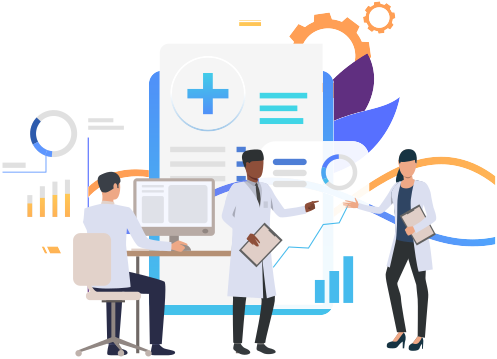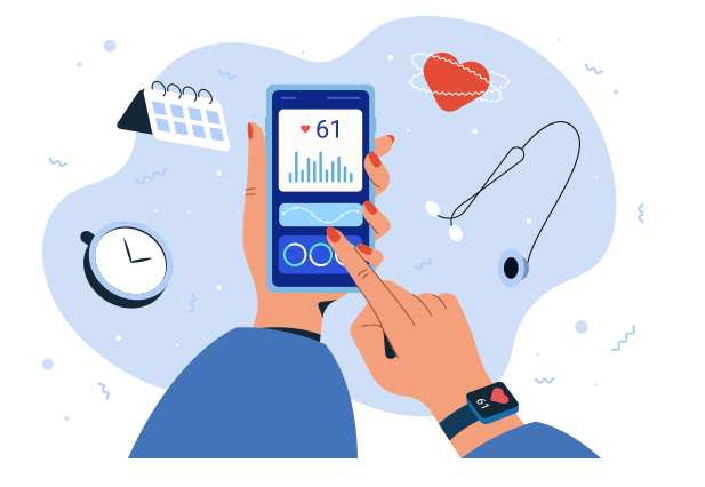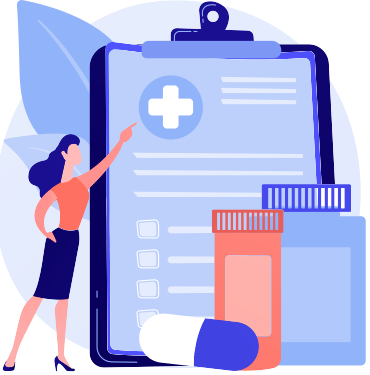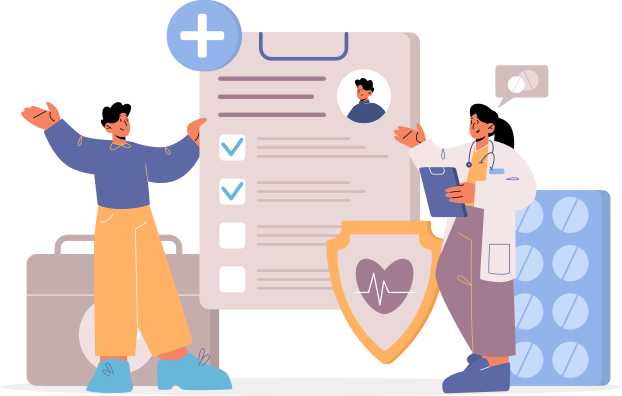We use cookies to enhance your experience. By continuing to use our site, you consent to the use of cookies.

We create software applications, platforms, and systems that are tailored specifically to the needs and requirements of your healthcare organization. Unlike off-the-shelf software products, custom healthcare software is designed to meet the unique needs of your healthcare organization and can be fully customized to your specifications.
Custom healthcare software development involves a wide range of software products, including electronic health records (EHRs),
telemedicine platforms, medical imaging software, health information exchanges, patient portals, clinical decision support systems,
and more. These products can be designed to address specific challenges or pain points in your healthcare industry, such as improving
patient outcomes, reducing administrative burdens, enhancing data security, and more.
The process of custom healthcare software development typically involves understanding the unique needs and requirements of your
healthcare organization, designing software solutions that address those needs, building and testing the software, and deploying it to
users. This process often involves close collaboration between healthcare experts, software developers, and other stakeholders to
ensure that the software meets the highest standards of quality, security, and usability.

We offer custom EHR (Electronic Health Record) application development services to manage the electronic health records of patients. EHR applications are designed to store, retrieve, and share patients' clinical and administrative data across different healthcare settings and providers.
EHR applications provide a comprehensive view of the patient's health history, including data from different sources such as labs,
imaging, and pharmacies. EHRs also support patient engagement and enable patients to access their health records, communicate with
their providers, and manage their health remotely.
Custom EHR applications are designed to meet the specific needs of your healthcare organization or medical practice, including
workflows, data collection, and reporting requirements. These applications can be tailored to integrate with different systems and
software applications, such as billing and scheduling systems, to streamline administrative processes and improve operational
efficiency.
Custom EHR applications offer several benefits, including improved patient care, increased efficiency, and better data security and
privacy. By providing a comprehensive view of a patient's health history, EHR applications can help healthcare providers make more
informed decisions and provide better care. Additionally, custom EHR applications can help healthcare organizations meet regulatory
compliance requirements, such as HIPAA, by ensuring data security and privacy.

Our medical billing software development services are used by healthcare providers and medical billing companies to manage and process
medical claims and billing information.
Medical billing software automates the billing process, helping healthcare providers and billing companies to create, submit, and
track medical claims electronically. The software also helps in managing patient insurance and billing data, including patient
demographics, insurance coverage, treatment details, and payment history
These software solutions can be customized to meet the specific needs of healthcare providers and medical billing companies, and can
be integrated with other systems and technologies, such as Electronic Health Records (EHRs), to provide a comprehensive view of
patient data.

Healthcare providers and medical billing companies use our healthcare claims management software development services to create, submit,
and track medical claims electronically.
Claims management software automates the claims processing workflow, helping healthcare providers and billing companies to manage and
process medical claims and billing information. The software also helps in managing patient insurance and billing data, including
patient demographics, insurance coverage, treatment details, and payment history.
These software solutions can be customized to meet the specific needs of healthcare providers and medical billing companies, and can
be integrated with other systems and technologies, such as Electronic Health Records (EHRs), to provide a comprehensive view of
patient data.

We offer custom secure online websites and applications that allow patients to access their health information, communicate with their healthcare providers, and perform various tasks related to their healthcare.
Patient portals provide patients with a convenient and secure way to access their medical records, lab results, and other health
information. They also allow patients to communicate with their healthcare providers, schedule appointments, refill prescriptions, and
pay bills online. Some patient portals also provide educational resources, such as health articles and videos, to help patients manage
their health.
Patient portals can be customized to meet the specific needs of healthcare organizations and can be integrated with other systems and
technologies, such as Electronic Health Records (EHRs), to provide a comprehensive view of patient data.
Our expertise and experience in creating healthcare solutions
12+ years in custom software development
Experience in developing HIPPA compliant software.
Expertise in healthcare standards like FHIR, ICD-10, HL7 etc.
We combine our broad experience, deep industry knowledge and technology trends to create innovative and effective solutions.
We employ best practices to ensure your systems are secure and fully compliant to applicable regulations.
Established Lean and Agile processes.
Mastering the Art of Software Development for Complex Projects.
Transparent project management and client communication.
Strategies and Best Practices for Successful Project Delivery
Everything from concept to deployment
Adoption of Agile methodology
Best Practices for Developing Safe and Resilient Applications in a Cybersecurity-Driven World.
Buid fast and scalable apps.
Creating value for Healthcare Clients with advanced technologies
Innovative, collaborative, agile and results driven
Planning is a crucial stage of any software development project, especially in the healthcare domain where quality, reliability and security are paramount. Our planning process ensures that we deliver software solutions that meet your expectations, budget and timeline

We believe that design is not just about aesthetics, but also about functionality and performance. That's why we apply a rigorous design process to every software development project we undertake in the healthcare domain

We use cutting-edge technologies and best practices to create software applications that meet the needs and expectations of healthcare providers and patients. Whether you need a custom web app, a mobile app, or a cloud-based system, we can program it for you

Reliability, security and accuracy are crucial in the healthcare sector. We ensure that every software product we deliver meets the highest standards of quality and compliance. We use a variety of testing methods and tools to verify the functionality, performance and usability of our software solutions across different platforms

After months of planning, designing, developing, and testing, our software product is finally ready for launch. The launch phase is when we make our product available to our customers and users. It is a crucial stage that requires careful coordination and communication among our team members and stakeholders


We understand that software development is not a one-time event, but a continuous process of improvement and adaptation. That's why we offer comprehensive support and maintenance services for our healthcare software solutions, ensuring that they meet the changing needs and expectations of your patients, staff, and regulators
Planning is a crucial stage of any software development project, especially in the healthcare domain where quality, reliability and security are paramount. Our planning process ensures that we deliver software solutions that meet your expectations, budget and timeline


Planning is a crucial stage of any software development project, especially in the healthcare domain where quality, reliability and security are paramount. Our planning process ensures that we deliver software solutions that meet your expectations, budget and timeline


Planning is a crucial stage of any software development project, especially in the healthcare domain where quality, reliability and security are paramount. Our planning process ensures that we deliver software solutions that meet your expectations, budget and timeline


Planning is a crucial stage of any software development project, especially in the healthcare domain where quality, reliability and security are paramount. Our planning process ensures that we deliver software solutions that meet your expectations, budget and timeline


Planning is a crucial stage of any software development project, especially in the healthcare domain where quality, reliability and security are paramount. Our planning process ensures that we deliver software solutions that meet your expectations, budget and timeline



Planning is a crucial stage of any software development project, especially in the healthcare domain where quality, reliability and security are paramount. Our planning process ensures that we deliver software solutions that meet your expectations, budget and timeline
Healthcare success stories
Have Questions? We’re here to help.
Custom healthcare software development is the process of designing, developing, and implementing software solutions specifically tailored to the unique needs and requirements of the healthcare industry. This can include software for electronic medical records (EMRs), practice management, medical imaging, patient portals, and more. Custom healthcare software development differs from off-the-shelf software solutions in that it is designed specifically for the needs of a particular healthcare organization or facility, and can often offer greater flexibility, functionality, and customization options.
One advantage of custom healthcare software development is that it can be tailored to the specific needs of a particular healthcare organization or facility, which can lead to greater efficiency, productivity, and improved patient outcomes. Additionally, custom software solutions can offer greater flexibility and customization options than off-the-shelf solutions. However, custom healthcare software development can also be more expensive and time-consuming than off-the-shelf solutions, and may require more extensive testing and validation to ensure regulatory compliance.
A custom software development service can include a wide range of activities, depending on the specific needs of the client. Typically, this includes requirements gathering and analysis, design and development, testing and validation, implementation and deployment, and ongoing maintenance and support.
The features that can be implemented in a healthcare software solution will depend on the specific needs and requirements of the client. Some common features include electronic medical records (EMRs), practice management tools, medical imaging software, telemedicine services, patient portals, and more. The exact features included in a healthcare software solution will depend on the specific needs of the healthcare organization or facility, as well as any regulatory requirements that must be met.
Developing healthcare software can be expensive, especially when compared to off-the-shelf solutions. This is because custom software development typically involves a more extensive development process, including requirements gathering and analysis, design and development, testing and validation, and ongoing maintenance and support. However, the benefits of custom software development can often outweigh the costs, as custom solutions can be tailored specifically to the needs of the healthcare organization or facility, and can offer greater flexibility and customization options.
We provide the following software development services for healthcare: 1. Building electronic health record (EHR) and electronic medical record (EMR) systems 2. Patient portals 3. Medical practice management solutions 4. Inventory management systems 5. Ongoing medical education platforms and more
We create mobile applications for medical professionals and their patients. Our team has a proven track record in both native Android and iOS apps, as well as their cross-platform counterparts.
For the safety of your business, its stakeholders, employees and clients, it's vital to choose a trustworthy vendor who follows the recognized security protocols. To ensure compliance with laws, regulations, and standards, our developers follow HIPAA (for the US market), GDPR (for EU data exchange), and PIPEDA (for Canadian data privacy).
By adopting strategies such as outsourcing, agile methodologies, automation, open-source software and quality assurance DIBS reduce development costs.
Our experienced QA team tests the application multiple times to make sure that you get quality product.
We treat healthcare software security as a priority from start to finish. DIBS has established habits, processes, and policies that ensure your information security and address ever-evolving security threats (including APT).
Healthcare apps can offer a wide range of advantages to patients and healthcare providers alike. These can include convenient, on-the-go access to healthcare services, improved patient engagement and communication, greater patient empowerment and self-management, and improved efficiency and productivity for healthcare providers. Additionally, healthcare apps can help to improve patient outcomes by providing more personalized, tailored care that is better aligned with the specific needs and preferences of each individual patient.
The type of software used in healthcare can vary widely depending on the specific needs and requirements of the healthcare organization or facility. Some common types of healthcare software include electronic medical records (EMRs), practice management tools, medical imaging software, telemedicine services, patient portals, and more.
The most important qualities of healthcare software will depend on the specific needs and requirements of the healthcare organization or facility. However, some common qualities that are important for healthcare software include ease of use and accessibility, robust security and data protection features, compliance with regulatory requirements, and the ability to integrate with other systems and applications as needed.
The future of healthcare software development is likely to be characterized by continued innovation and the development of new technologies and solutions to meet the evolving needs and requirements of the healthcare industry. This may include the development of new tools and applications for telemedicine, patient engagement, and data analytics, as well as the continued evolution of electronic medical records (EMRs) and other core healthcare software solutions.
Custom healthcare software development can be challenging due to the complex regulatory environment in which healthcare operates, as well as the need to balance the unique needs and requirements of each healthcare organization or facility with the broader trends and developments in the healthcare industry. Additionally, healthcare software developers must ensure that their solutions meet the highest standards for security and data protection, and must be able to navigate the complex landscape of healthcare regulations and compliance requirements.
A Hospital Management System (HMS) is a type of healthcare software that is designed specifically to manage the administrative and operational functions of a hospital or other healthcare facility. This can include functions such as patient registration and tracking, appointment scheduling, billing and payment processing, and inventory management, among others.
Hospitals use a wide range of software systems, depending on their specific needs and requirements. Some common types of software used in hospitals include electronic medical records (EMRs), practice management tools, medical imaging software, telemedicine services, patient portals, and more.
The best software for a hospital management system will depend on the specific needs and requirements of the hospital or healthcare facility in question. Some popular options for hospital management software include Epic, Cerner, and MEDITECH, among others.
Patients can benefit from the use of Hospital Management Systems (HMS) in a number of ways. For example, HMS can help to streamline the administrative and operational functions of a hospital or healthcare facility, making it easier and more efficient for patients to schedule appointments, access medical records, and communicate with their healthcare providers. Additionally, HMS can help to improve the overall quality of care by providing healthcare providers with access to more complete and accurate patient information, facilitating more effective communication and collaboration among providers, and enabling more personalized, tailored care that is better aligned with the specific needs and preferences of each individual patient. Ultimately, the use of HMS can help to improve patient outcomes, enhance patient satisfaction, and reduce costs and inefficiencies within the healthcare system as a whole.
Insights and inspiration for curious minds